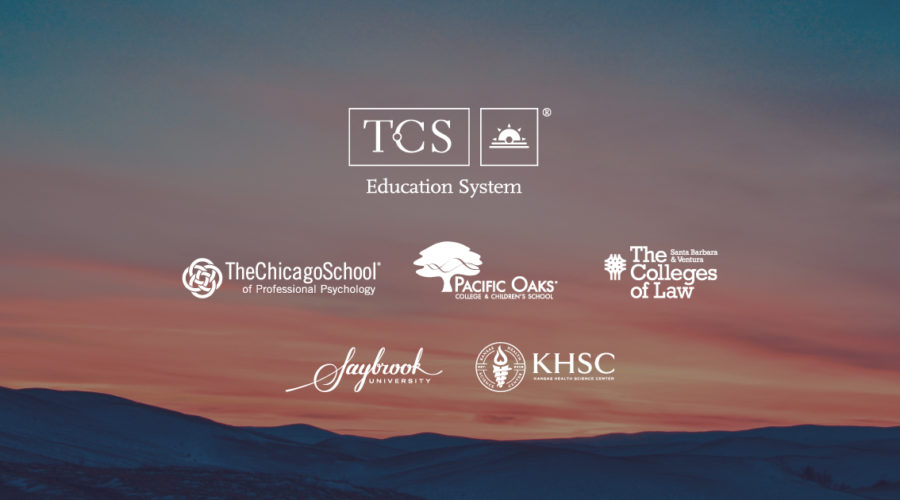How 2020 has changed us for the better
While 2020 has been a tumultuous year, the TCS community has come further than we could have imagined, both professionally and personally. We need look no further for evidence of this than the response by our leadership team in the face of the COVID-19 pandemic. Leaders from across each institution and the System Office met daily or weekly, as was necessary, to strategize and discuss action plans that would smooth operations for all and create as seamless an experience as possible for students.
Recently, these leaders came together to consider the past year and the ways our communities have continually shown up for each other. We encourage you to take a moment to also reflect on the silver linings of the past year.
Dr. Michael Horowitz, President of TCS Education System
Radical Cooperation
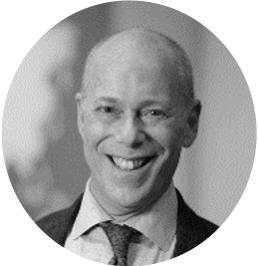
The spirit of Radical Cooperation is the philosophy that has guided TCS since its inception, and this year we’ve seen it in action like never before. One of my favorite stories is about a French relay team that wins its race—not because they are the fastest but because they worked together so well. That’s what Radical Cooperation is about. I’m humbled and inspired when I think about the ways that we’ve all come together to serve our community of more than 10,000—from students to faculty and staff. Our whole community has kept moving forward in spite of the world around us. Not only have we continued the work needed to positively impact the world, but we’ve also shown up for our students every day. With an abundance of positive stories sharing innovative solutions and personal support, I’m reinvigorated by the people who make up our system—each and every one of them. Our leadership, philosophy of Radical Cooperation, and our culture of community matter—they are how we work toward our ultimate goal of serving students and changing communities around the world.
—
Dr. Michele Nealon, President of The Chicago School of Professional Psychology
Connection and impact
 This year more than 40% of Americans reported experiencing mental health issues because of the pandemic. This horrible statistic has had one positive effect: destigmatizing mental health issues. It’s a positive step that people are coming forward, but it also sheds light on how important mental illness treatment is. This past year, The Chicago School has become a national leader in telehealth trainings and mental health workshops for organizations across the country, and we’re proud to help meet this need for our communities. We’ve had numerous faculty offer their knowledge and skills pro bono to provide psychoeducation for external and internal audiences on matters related to mental health, stress, and self-care. I’m inspired by the ways that our community has leveraged our expertise and resources to help everyone get through this period. We’ve come together across campuses, colleges, states, and even nations to meet this need.
This year more than 40% of Americans reported experiencing mental health issues because of the pandemic. This horrible statistic has had one positive effect: destigmatizing mental health issues. It’s a positive step that people are coming forward, but it also sheds light on how important mental illness treatment is. This past year, The Chicago School has become a national leader in telehealth trainings and mental health workshops for organizations across the country, and we’re proud to help meet this need for our communities. We’ve had numerous faculty offer their knowledge and skills pro bono to provide psychoeducation for external and internal audiences on matters related to mental health, stress, and self-care. I’m inspired by the ways that our community has leveraged our expertise and resources to help everyone get through this period. We’ve come together across campuses, colleges, states, and even nations to meet this need.
—
Dr. Jack Paduntin, President of Pacific Oaks College & Children’s School
Adaptability and service
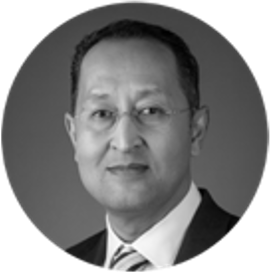 We won’t know the long-term effects of our physically distant 2020 for years to come, but when I think of those who have likely been affected more than most, it’s children. With more than 75 years of service, Pacific Oaks Children’s School has met the moment time and time again, and this year’s pandemic was no different. The adaptability of the Children’s School and its community has exceeded all of my hopes and expectations. Determining how to open this fall while keeping students, teachers, and parents safe was an incredible feat that could not have been accomplished without collaboration and skill. We knew that we wanted to remain focused on our goal of community service, and with adaptability as a key competency, I’ve seen more hope on the horizon than ever before. Being able to see the hope even during our collective trauma is key for children and adults alike. Every day is meaningful when you have hope, and I’ve seen this throughout our community of parents and children who benefit from their education at the Children’s School.
We won’t know the long-term effects of our physically distant 2020 for years to come, but when I think of those who have likely been affected more than most, it’s children. With more than 75 years of service, Pacific Oaks Children’s School has met the moment time and time again, and this year’s pandemic was no different. The adaptability of the Children’s School and its community has exceeded all of my hopes and expectations. Determining how to open this fall while keeping students, teachers, and parents safe was an incredible feat that could not have been accomplished without collaboration and skill. We knew that we wanted to remain focused on our goal of community service, and with adaptability as a key competency, I’ve seen more hope on the horizon than ever before. Being able to see the hope even during our collective trauma is key for children and adults alike. Every day is meaningful when you have hope, and I’ve seen this throughout our community of parents and children who benefit from their education at the Children’s School.
—
Dr. Matt Nehmer, President of The Colleges of Law
Spirit of connectedness and innovation
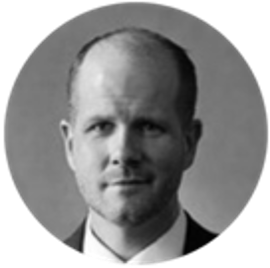 This year I’ve seen connection take on a new meaning. I’m more connected to our community of students, leaders at the Colleges of Law, and at TCS than ever before—and it’s not just because we’re seeing and meeting with each other on Zoom more. It’s because we’re spending more time acknowledging and inquiring about each other. A sense of positivity resonates throughout our interactions, which I believe will continue to help us focus on what really matters. I like the concept of “anti-fragility,” which even more than resiliency means that we are actually better because of pressure. We don’t just stand up to pressure, we become stronger because of it. The circumstances of this past year have given us the opportunity to reset how we spend our time and where we place our focus. The Colleges of Law has long been devoted to innovation, and in that spirit we’ve embraced this moment to make the experience better for all of our students. Personally, I’ve also been able to connect with students in ways I haven’t had the time to do in the past. From reading personal statements to emailing students individually about their experiences, I feel more in tune with our mission and values than ever before.
This year I’ve seen connection take on a new meaning. I’m more connected to our community of students, leaders at the Colleges of Law, and at TCS than ever before—and it’s not just because we’re seeing and meeting with each other on Zoom more. It’s because we’re spending more time acknowledging and inquiring about each other. A sense of positivity resonates throughout our interactions, which I believe will continue to help us focus on what really matters. I like the concept of “anti-fragility,” which even more than resiliency means that we are actually better because of pressure. We don’t just stand up to pressure, we become stronger because of it. The circumstances of this past year have given us the opportunity to reset how we spend our time and where we place our focus. The Colleges of Law has long been devoted to innovation, and in that spirit we’ve embraced this moment to make the experience better for all of our students. Personally, I’ve also been able to connect with students in ways I haven’t had the time to do in the past. From reading personal statements to emailing students individually about their experiences, I feel more in tune with our mission and values than ever before.
—
Dr. Nathan Long, President of Saybrook University
Commitment and follow-through
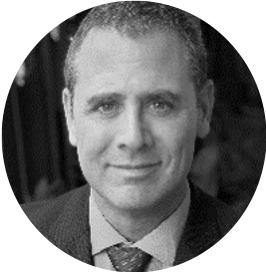
This year has reminded me of a quote by the late Kirk Douglas from a movie of long ago: “Remember the follow through.” Nothing has been quite as important or motivating to me this year than the value of following through. This has been a triple pandemic—COVID-19, the economy, and racial injustice. We’ve been thrust into a moment that demands we meet the needs of our family, friends, and ourselves in ways we may not have had to before. Through it all, I’ve been inspired by the way that Saybrook University and each of the colleges in The Community Solution have come together in our collective commitment to improve our communities in the ways that we each do best. There is not a one-size-fits-all approach. The problems are large enough that each of us needs to do what we can separately and together to accomplish a better way forward. I’m proud that we are committed together for the short-, mid-, and long-term work for our collective mission to be agents of change.
—
Dr. Tiffany Masson, President of Kansas Health Science Center
Persistence and determination

With a new college like ours, or any startup really, it would’ve been very easy to give up this year. In fact, I imagine that many startups did. With a pandemic and social justice issues, there were competing priorities everywhere. I’m thankful, however, that the TCS community wrapped its arms around KHSC and helped us move forward—it motivated us to continue working toward our ultimate goal. In fact, these crises encouraged us to reimagine our developing curriculum, to focus even more on diversity, inclusion, and the values that I know will set us on a path to a more equitable future in osteopathic education and beyond. I am continually invigorated by the ways that our community engages in deeper conversation and how we think outside the box to serve our students and each other now and in the future.
—
Deborah Markos, M.S., TCS Education System Chief Operating Officer
Appreciation and inspiration
 The most inspiring aspect this year to me is not the metrics and goals that we’ve achieved—it’s the way that we’ve supported and connected with each other to advance the organization. We’ve all experienced exhaustion—mentally and physically—but the ways that we’ve taken the time to support each other through the personal challenges many have experienced and encouraging our teams to care for their mental and physical health, has allowed us to continue to meet the moment and remain successful. Any organization can define success in a number of ways. This year, more than any other, has shown us that a very important part of success for TCS Education System is the quality of our relationships.
The most inspiring aspect this year to me is not the metrics and goals that we’ve achieved—it’s the way that we’ve supported and connected with each other to advance the organization. We’ve all experienced exhaustion—mentally and physically—but the ways that we’ve taken the time to support each other through the personal challenges many have experienced and encouraging our teams to care for their mental and physical health, has allowed us to continue to meet the moment and remain successful. Any organization can define success in a number of ways. This year, more than any other, has shown us that a very important part of success for TCS Education System is the quality of our relationships.
—
Rick Merrick, TCS Education System Chief Information Officer
Purposeful and communicative

When we started discussions about moving to a completely remote work environment, it was immediately clear to me that the IT department would be a key component to our success or failure. What I found humbling during this transition was the way that everyone across the system adapted. From training to implementing, each department and individual supported these changes, and therefore we didn’t skip a beat as an organization. We did not flounder in the beginning—we made the decision to offer remote work stipends; we made the decision early about learning in the fall. And then we prioritized communicating this to our community. I was inspired by this purposeful direction, and it’s changed me as a leader as well. From beginning to host all-team meetings, to launching a new IT newsletter that features our employees, I know that as a community we’ve gotten closer—and it’s not just because the technology has allowed us into each other’s homes; it’s because we’re supporting and collaborating with each other purposefully.
—
Shari Mikos, M.S., TCS Education System Chief of Staff
Compassion and focus

TCS has been focused on what matters—students—for more than 10 years. But this year, amid all of the challenges, I feel we really honed in on that sense of community and focused on what matters more than ever. The support we give our community system-wide is always awe inspiring to me and has become even more extraordinary as TCS has rallied together, showing compassion and empathy, while remaining steadfast to our work. The cohesion of our community is why we are able to work together to help educate agents of change throughout the world.
—
Don Packham, MBA, TCS Education System Chief Human Resources Officer
Optimism and resiliency

We’ve brought new meaning to the word “community” this year. We’ve supported each other when people got sick, or employees lost loved ones. Time and time again, I saw our community surround these members with resources of all types. We have been resilient through every difficult situation we’ve faced this year, and it is because of our devotion to the human spirit. Our leadership team feared neither the darkness nor the light, and because of that, our community has not only survived this year but has also come closer together and is stronger for it.
—
Mehul Patel, MBA, TCS Education System Chief Financial Officer
Change and performance

Most of us have never seen this amount of change—across every element of our lives—during our lifetime. Personally, how we interact with loved ones, our personal health, securing childcare—we’ve had to constantly adjust to address the external changes we’ve faced. When we think about our professional lives, this change wreaked just as much havoc. Now when we put these changes up against our accomplishments this year, it is astounding. Our community has done a great job. Despite the unknowns consistently thrown at us, we’ve adjusted well and continued to excel—all the while connecting and supporting our teams on a human level.
—
Dr. Leanne Wruck, TCS Education Chief Academic Officer
Celebration and renewal

To be a part of an organization that celebrates people is so wonderful, and I’m proud of the ways that we’ve kept this feeling virtually even in these difficult times. Our natural sense of celebration and personal connection has only deepened. We’ve been let into people’s homes and families. I’ve watched a colleague sooth her child during a particularly tough moment that happened to take place during a meeting and been on the phone with another while they ran home to grab a forgotten permission slip. The personal has become the professional and vice versa. As a leader now, it is about more than just knowing the names of the kids—it’s actually seeing them—on the good days and the bad. This type of connection hasn’t stopped at our System Office community; it’s gone deeper because of the resources our partner colleges have provided. Through hosting sessions and leading conversations about social justice and equity, I’ve seen a renewed effort to help ensure that our curriculum has more diverse sources of thought. I have been inspired by the realization that our community provides spaces to help us each see how we can make the effort to solve these larger systemic issues.

